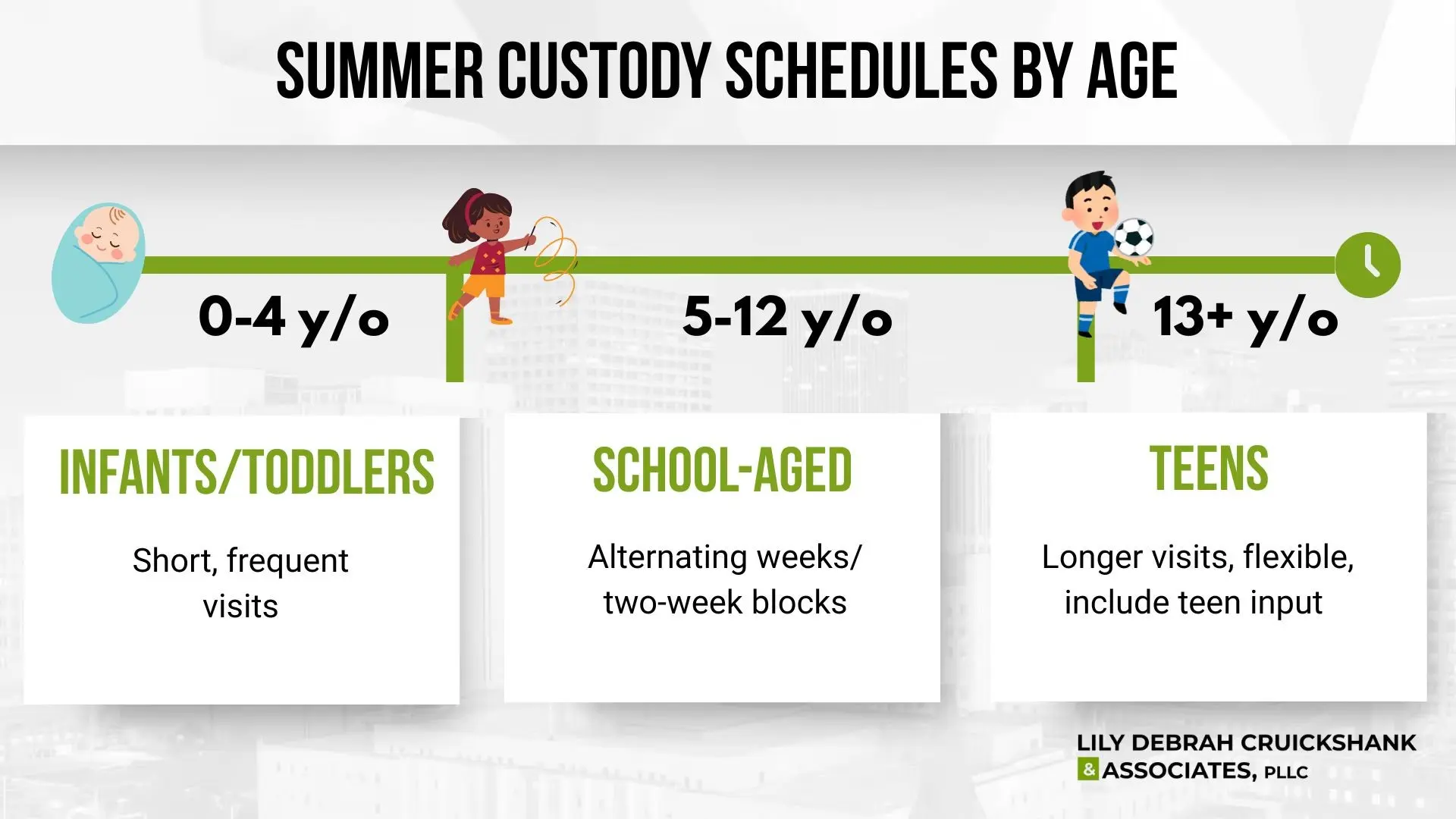
Practical Guide to Summer Visitation Schedules in Oklahoma City
Summer break brings excitement and new opportunities for children, but for co-parents, it can also mean big changes in routines. Without the structure of the school year, many families need to adjust their parenting plans to fit vacations, camps, and longer visits.Choosing the right schedule helps children feel secure and ensures both parents get quality time together. If you're unsure how to approach this process, our expert Oklahoma City child custody attorney can provide guidance to create a summer plan that works for everyone.
How Does Summer Visitation Work?
Summer visitation refers to the time children spend with each parent while school is out. Many parenting plans include provisions for summer schedules, keeping the existing arrangement or shifting to something more flexible. Some parents alternate weeks, while others choose extended blocks of time that allow for vacations or long visits, especially if parents live far apart.
The goal of summer visitation is to ensure children enjoy quality time with both parents while still being able to participate in camps, trips, or other summer activities.
Age-Based Summer Custody Plans for Parents
Children's developmental stages play a significant role in deciding the best summer visitation plan. What works for a toddler won't necessarily fit a teenager. Here are age-based guidelines:

Summer Visitation Schedules for Infants & Toddlers (0–4 Years Old)
Very young children thrive on stability and predictability. Short, frequent visits, such as alternating days or weekends, help maintain a consistent routine and reduce stress. Extended blocks away from either parent are usually discouraged.
Summer Parenting Schedules for School-Aged Children (5–12 Years Old)
With more independence and activities, alternating weeks or two-week blocks often work well. This balance gives children stability while still allowing flexibility for camps, sports, or family vacations.
Summer Custody Options for Teenagers (13 and Up)
Teens may want input in their schedule since they often juggle jobs, social plans, and extracurriculars. Longer visits, like dividing the summer in half or alternating every two weeks, can be effective. Listening to their preferences helps them feel respected and ensures smoother cooperation.
Summer Visitation Schedule Examples
Co-parents use many different structures for summer parenting. Some of the most common include:
- 2-2-3 schedule: The child spends two days with one parent, two days with the other, and then three days with the first parent. This pattern repeats, but can be harder in summer due to frequent exchanges.
- 2-2-5-5 schedule: Two days with one parent, two with the other, followed by five days with each parent. This allows for longer blocks of time than 2-2-3.
- 3-4-4-3 schedule: Parents alternate between three and four days. It balances frequent contact with fewer transitions.
- Week-on, week-off: Each parent has the child for an entire week. This is simple and predictable, working well for school-aged kids.
- Alternating every two weeks: Each parent has two continuous weeks. Ideal for vacations or camps, but may be difficult for younger children.
- Whole summer with one parent: Often used when one parent lives far away and cannot see the child regularly during the school year. The child spends the majority of the summer with the noncustodial parent.
- Every weekend or alternating weekends: Keeps weekdays stable (for camps or jobs) while the noncustodial parent enjoys consistent weekend time.

Factors to Consider When Determining Summer Custody Schedules
When you're putting together a summer custody plan, several factors can shape what works best for your family:
Your Child's Age and Needs
Different ages call for different approaches. Younger kids may need shorter, more frequent visits, while older children and teens can usually handle longer stretches with each parent.
Each Parent's Work Schedule
Summer routines often look different for adults, too. For example, teachers may be more available during the summer months, while other parents may work seasonal jobs that get busier.
Camps, Sports, and Activities
Many children participate in summer programs that run on a fixed schedule. Your custody plan should take these into account to keep things consistent for your child.
Vacation Plans
Both parents often want extended time for travel or family trips. Planning ahead helps ensure everyone gets a fair chance without overlap or conflict.
Distance Between Households
If parents live far apart, longer blocks of visitation may make more sense than frequent exchanges, which can be disruptive or impractical.
Siblings and Blended Families
Custody plans often affect more than one child. Coordinating schedules so siblings can spend quality time together (full or step-siblings) is an important consideration.
The Child's Preferences
As children get older, their opinions matter more. Teens especially, may want input about how they spend their summer, balancing family time with friends, work, or other commitments.

Why It's Important to Consider a Different Custody Schedule for Summer
A school-year custody plan doesn’t always work for summer or holiday visitation schedules. Without classes, kids have new routines: later bedtimes, outdoor activities, and sometimes less structure. Summer also brings opportunities like camps, sports programs, and vacations that require longer, more flexible blocks of time. For children, this often means fewer transitions and more consistency, helping them settle in and enjoy their break.
Summer can also give long-distance parents a chance for extended parenting time they don't get during the school year. And since many parents' work schedules shift in summer (some are freer, others busier), a separate plan ensures both parents' availability is taken into account. Adjusting the schedule helps reduce conflict, supports children's activities, and creates space for quality family time.
How to Communicate About the Summer Parenting Schedule
Start by reviewing your parenting plan to see if it already addresses summer. If not, reach out to your co-parent early to discuss camps, vacations, and work schedules before plans are set. Keep conversations child-focused and businesslike, and put agreements in writing to avoid confusion.
Be flexible where possible — compromise helps create a smoother summer for everyone. If disagreements arise or visitation rights are denied by any parent, mediation or legal guidance can provide solutions. Clear, respectful communication ensures your child feels secure and both parents stay on the same page.
Easiest Way to Create and Track Summer Custody Schedules
Managing custody schedules manually can be stressful. Using a co-parenting calendar or app helps map out the entire summer, send requests, and track vacation dates. Many tools allow you to separate summer from school-year schedules for clarity. Having everything in one place helps both parents and children feel secure.
Making Summer Custody Work for Your Family
Summer break should be a season of joy, not conflict. By planning ahead, considering your child's age and needs, and maintaining open communication, you can create a summer custody schedule that works for everyone. The arrangement might involve alternating weeks, extended visits, or a custom plan; the key is flexibility and cooperation. A thoughtful approach ensures your children enjoy the summer while staying connected with both parents.
If you need guidance creating or modifying a summer parenting plan, our experienced family child custody attorneys are here to help. Reach out to us today to discuss your options and protect your child's best interests.
To schedule a meeting with an attorney, please call the firm or complete the intake form.
Recent Posts

Our Reach: Serving Oklahoma City and Beyond
We proudly serve the Oklahoma City community from our downtown office.Our experienced legal team extends its reach to surrounding areas, providing comprehensive family law services to families throughout the region.
Find Clarity and Direction for Your Family's Legal Matters!
Are you facing a family law challenge? Our experienced attorneys provide strategic legal representation, protecting your rights and ensuring the best possible outcome. Schedule a consultation to discuss your situation and develop a plan.
- Address722 N Broadway Ave
Suite 402
Oklahoma City, OK 73102 - Phone(405) 606-3062
- Fax(405) 606-3065
- OKLAHOMA OFFICE
- Review Us

.avif)